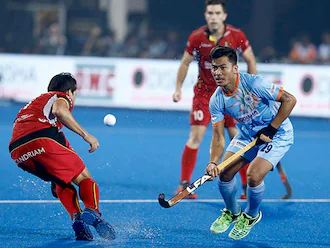In a move that has generated considerable discussion within the global hockey community, Malaysia has decided not to invite Pakistan to participate in the upcoming edition of the prestigious Sultan Azlan Shah Hockey Cup. This decision marks a significant moment in the long-standing history of the tournament, especially considering Pakistan’s deep-rooted legacy in international hockey. Once a dominant force in the sport, Pakistan’s exclusion has left fans and analysts speculating about the reasons and implications behind this decision.
A Glorious Past Now in Question
The Sultan Azlan Shah Hockey Cup, held annually in Ipoh, Malaysia, is one of the most respected invitational tournaments in field hockey. Since its inception in 1983, the tournament has hosted some of the finest hockey nations in the world. Pakistan, a three-time Olympic gold medalist and four-time World Cup champion, has participated regularly and even won the tournament multiple times. However, in recent years, Pakistan’s performance and administrative consistency have noticeably declined, raising concerns about the viability of its participation in top-tier international competitions.
Declining Standards and Global Rankings
One of the primary reasons cited for Pakistan’s exclusion is its continuing fall in global rankings. Once ranked among the top three, Pakistan now struggles to remain relevant on the international stage, with inconsistent performances and early exits in major tournaments. Their current FIH (International Hockey Federation) world ranking is significantly lower compared to other traditional and emerging hockey powers.
Organizers of the Sultan Azlan Shah Cup aim to invite teams that can guarantee a high level of competition, which helps maintain the tournament’s prestige. In this context, Pakistan’s declining form and lack of international competitiveness may have been a decisive factor in Malaysia’s decision.
Administrative Challenges
Apart from performance issues, Pakistan hockey has been marred by internal administrative turmoil. The Pakistan Hockey Federation (PHF) has been criticized for poor governance, lack of funding, and frequent changes in leadership. Mismanagement of training camps, late preparations, and the inability to secure international exposure for players have weakened the national team further. Countries hosting elite-level tournaments like the Sultan Azlan Shah Cup tend to avoid inviting teams with uncertain logistics and potential organizational issues, as it may affect the event’s planning and quality.
Financial Constraints and Late Confirmations
Another crucial factor influencing Pakistan’s exclusion could be financial instability. In previous years, the PHF has reportedly failed to confirm participation in time due to funding delays. Such late confirmations pose challenges for tournament organizers who need to finalize fixtures, travel logistics, and accommodation arrangements well in advance. Malaysia’s decision could therefore be a proactive move to ensure smoother planning and avoid last-minute complications.
Shift in Malaysia’s Strategic Focus
Malaysia, as the host nation, has been aiming to elevate the status of the Sultan Azlan Shah Cup by attracting top-ranked teams. In recent editions, teams like Australia, India, Japan, South Korea, and Argentina have made appearances, showcasing fast-paced, modern hockey. Including lower-ranked teams may not align with the tournament’s evolving vision. By excluding Pakistan, Malaysia might be signaling a preference for more competitive and stable teams that match the current tempo and standards of international hockey.
Reactions in Pakistan
Unsurprisingly, the decision has drawn sharp reactions from within Pakistan. Former players and sports analysts have expressed disappointment, calling the exclusion a “wake-up call” for Pakistan hockey. Critics argue that it reflects the consequences of years of neglect, poor management, and underinvestment in grassroots development. They believe that if corrective steps are not taken soon, Pakistan could become a permanent outsider in elite hockey competitions.
Some voices in the Pakistani media have accused the organizers of being politically influenced or of harboring regional biases. However, most international observers believe the decision is grounded in performance metrics and logistical reliability rather than politics.
Lessons and the Road Ahead
Pakistan’s absence from the Sultan Azlan Shah Hockey Cup should be viewed as more than just a missed invitation; it is a glaring sign that the nation must overhaul its hockey structure. Experts argue that unless the PHF focuses on nurturing young talent, modernizing coaching techniques, improving infrastructure, and securing sustainable funding, Pakistan will continue to slide further down the global rankings.
Rebuilding trust with international organizers is also essential. Regular participation in global competitions requires assurance of timely confirmations, disciplined conduct, and adherence to international standards. If Pakistan wants to regain its seat at the elite table, it must first demonstrate that it can manage its internal affairs efficiently.
Malaysia’s Stance
From Malaysia’s standpoint, the decision, while controversial, appears to be in line with the strategic objectives of elevating the competition. The country has invested significantly in improving its own hockey capabilities, and the tournament is seen as a platform to test its national team against top-tier opponents. With rising hockey nations emerging in Asia and Europe, the organizers likely felt that including a struggling team would diminish the overall competitiveness of the tournament.
Malaysia has not made any official statement directly criticizing Pakistan but has emphasized its intention to host “a high-quality tournament with competitive teams.” That, in itself, sends a clear message about the expectations for future participation.
Conclusion
Pakistan’s exclusion from the Sultan Azlan Shah Hockey Cup serves as a sobering reflection of the country’s current hockey crisis. While disappointing, it presents an opportunity for introspection and course correction. For a nation that once ruled the world of field hockey, the fall from grace has been steep—but not irreversible. With sincere efforts, structural reforms, and a renewed vision, Pakistan can aim to reclaim its former glory.
Until then, invitations to prestigious tournaments like the Sultan Azlan Shah Cup may remain elusive, serving as a stark reminder that in the world of competitive sports, reputation alone is no longer enough—performance, professionalism, and progress are what truly count.

